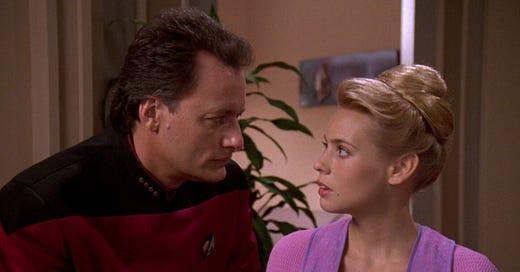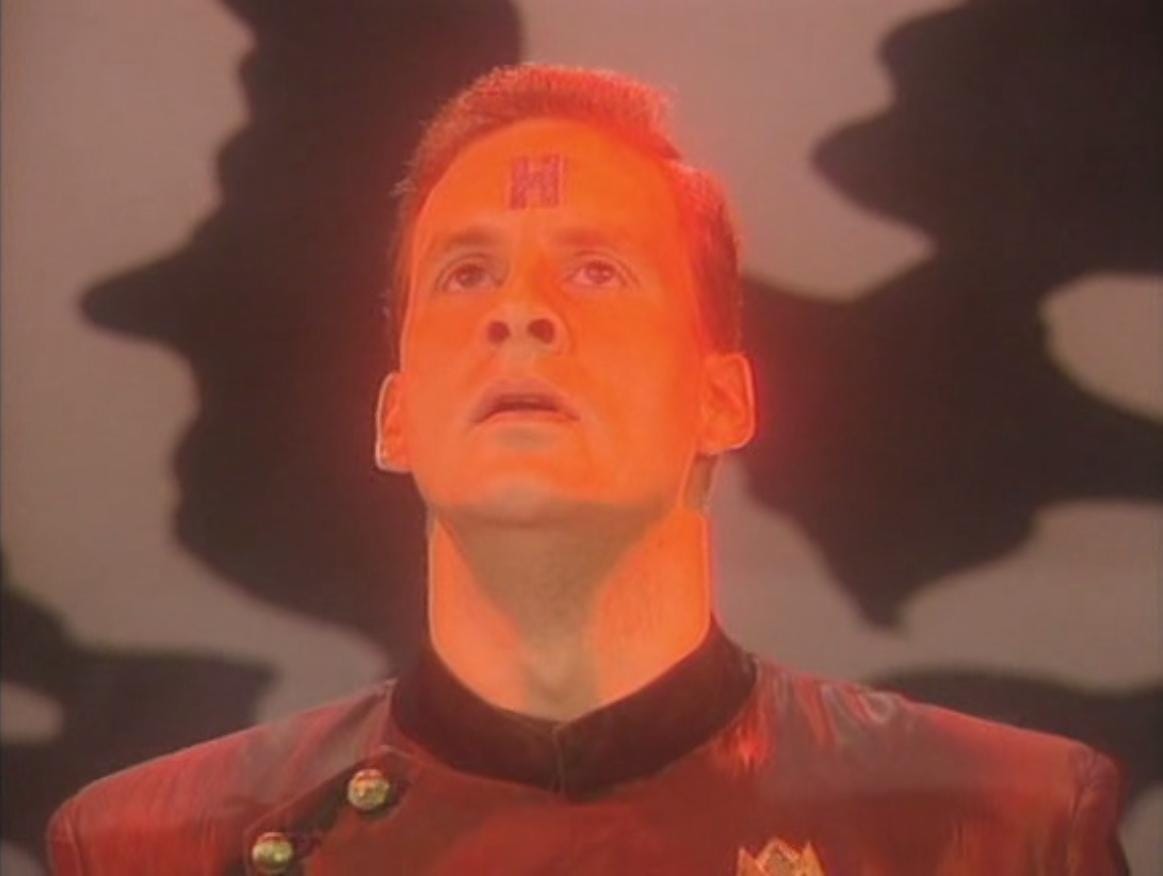How the worst characters in sci-fi help me deal with the problem of evil
And now I can justify how much time I spend watching these shows
One question I’m asked over and over by atheists is why God allows evil and suffering. Why doesn’t God intervene in the human course of things more than he apparently does?
For instance, why doesn’t he cure cancer?
Why doesn’t he intervene to stop innocent children from being hurt or killed?
Why doesn’t he prevent wars, famines, and plagues?
Without a good explanation, atheists are often resigned to the idea that, if God exists, he truly doesn’t care about us.
I confess that sometimes it does feel this way. And I don’t pretend to know why God allows so much evil and suffering in the world. But I do have a suspicion, and a recently-watched episode of my favorite sci-fi show reinforced that.
I’m rewatching Star Trek: The Next Generation for the seventh or maybe twentieth time (I’ve lost count), but each time I rewatch this show it takes on a new dimension. This time around, the dimension is moral.
This particular episode, called “True Q,” centers around a teenage girl, Amanda, who discovers that she’s not human, but rather a Q—an omnipotent being from another dimension. Her Q parents were killed when she was an infant, and, being raised by adoptive human parents, she didn’t realize what she was until her powers began to develop.
The Q are truly omnipotent. They can do anything they can imagine, from reshaping planets to resurrecting people. The Q we’re most familiar with, played brilliantly by actor John de Lancie, was initially a Loki-esque trickster who occasionally tormented the crew of the starship Enterprise; but as the show progressed, this Q became somewhat benevolent.
This time, Q comes back to the Enterprise, where Amanda is working as a medical intern, to tell her that she must decide between living as a human in the material universe or living as a Q in their dimension. If she chooses to live as a human, she cannot, under any circumstances, use her Q powers, as her parents did. It’s not long before she’s faced with temptation: an inhabited planet’s atmosphere is moments away from being fatally polluted. She impulsively saves the planet, proving to herself and Q that she no longer belongs in the human world.
Since the Q can pop into the material universe and interact with people any time they like, this doesn’t mean she’s banished from the universe, she just can’t live here as a human.
As I was watching this episode, I imagined how satisfying it would be for Amanda, as a kind and conscientious person, to come back as a sort of savior Q. Existing beyond the confines of time and space, she could go from planet to planet and use her power to save people from all sorts of calamities. She could stop wars. She could give people clean, safe environments, limitless energy, and all the food they needed. She could prevent natural disasters of every kind. She could give people wondrous technology to make their lives easier.
But what would that actually accomplish?
In such an existence, what is left for mortals to do? What power do we have to do good in the world? What roles could kindness and generosity possibly play? What opportunities are there for courage and self-sacrifice, for daring and adventure, for goals, motivation, and accomplishment? Would we ever need to learn humility or gratitude? For what reason would we ever need to negotiate, compromise, or find ways to work with each other?
With such a savior in our world, we wouldn’t be free agents with the power to do good and evil so much as glorified pets.
Without evil in the world, would there be any room for its opposite? As awful as suffering is, and as shocking as this sounds, I wonder if living in a material world without the possibility of suffering would be even worse. That may be one reason God allows evil and suffering.
Okay, so what if, instead of meeting everyone’s needs, God just prevented people from committing evil acts?
I have a sci-fi-based suspicion about that, too, from one of my other all-time favorite TV shows, the British sci-fi Red Dwarf.
The show’s premise is that an accident on the deep-space mining ship Red Dwarf releases deadly radiation, killing all 1,167 members of the crew, but one. The ship’s slacker, Dave Lister, has been in stasis—a chamber in which time stops—and because he was unaffected by time, he is safe from the deadly radiation. The ship’s AI-like computer, Holly, keeps Lister in stasis until the radiation drops to save levels—about three million years later. To prevent Lister from dying of loneliness three million years into deep space, Holly resurrects Lister’s obnoxious roommate, Arnold Rimmer, as a hologram.
The show features a cast of entertainingly pathetic characters, but Rimmer is by far the most pathetic. He is an unnerving amalgam of our worst qualities as humans. He’s petty, self-righteous, self-loathing, cowardly, jealous, and officious, and he also secretly believes he’s responsible for the accident that killed everyone on board the Red Dwarf. So deeply buried is this guilt that, at first, he’s not even conscious of it. This becomes the key point of an episode called “Justice.”
When the crew of the Red Dwarf touches down on a long-deserted prison planet, a conscience-scanner detects Rimmer’s unconscious sense of guilt and convicts him of the second-degree murder of everyone who was on board the ship. He’s sentenced to 9,328 years in prison, and because he’s a hologram, he will serve every one of those nine-thousand years.
While in prison, Rimmer discovers the “justice field” that discourages criminal acts. Any attempt to commit a crime—whether an act of violence or anything else—doesn’t affect the intended victim, but rather the perpetrator. If you try to steal something from someone else, something of yours goes missing. If you try to stab someone, you bear the wound, not your would-be victim. Prisoners quickly realize there’s no point committing crimes, so they behave.
Now, imagine we lived in a universe that was governed by a justice field. Our human hearts are the same, we would have all the same desires and motivations to do bad things and the same free will to do them. The only difference would be that we are immediately affected by whatever actions we freely choose. My guess is that there wouldn’t be much crime.
But, again, what would that actually accomplish?
Is there any repentance under such a system? Genuine changes of heart? A willing dependence on God to transcend ourselves? Any changes in behavior, from the earliest moments of our lives, would be purely out of self-interest instead of love for God and love for others.
Again, I think living in such a world would be worse than the world we live in now.
I’m not a theologian, and I have no deep knowledge of this subject beyond what anyone learns from living in this world. But working logically through the alternatives, I don’t think it’s possible in this realm to have free will and not have evil and suffering. I suspect our freedom to choose is rooted in God’s love and is so important to him that he’s willing to permit evil and suffering—which I’m certain he hates—so that we can experience whatever good comes from that free will, both in this world and the next.
And God loves us so much that he didn’t leave us alone to suffer the consequences of our free will, but came into the world in the humble person of Jesus Christ, who took on all of our freely-chosen misdeeds so that we can not only experience His peace in this world, but the good in the next world with Him forever.






